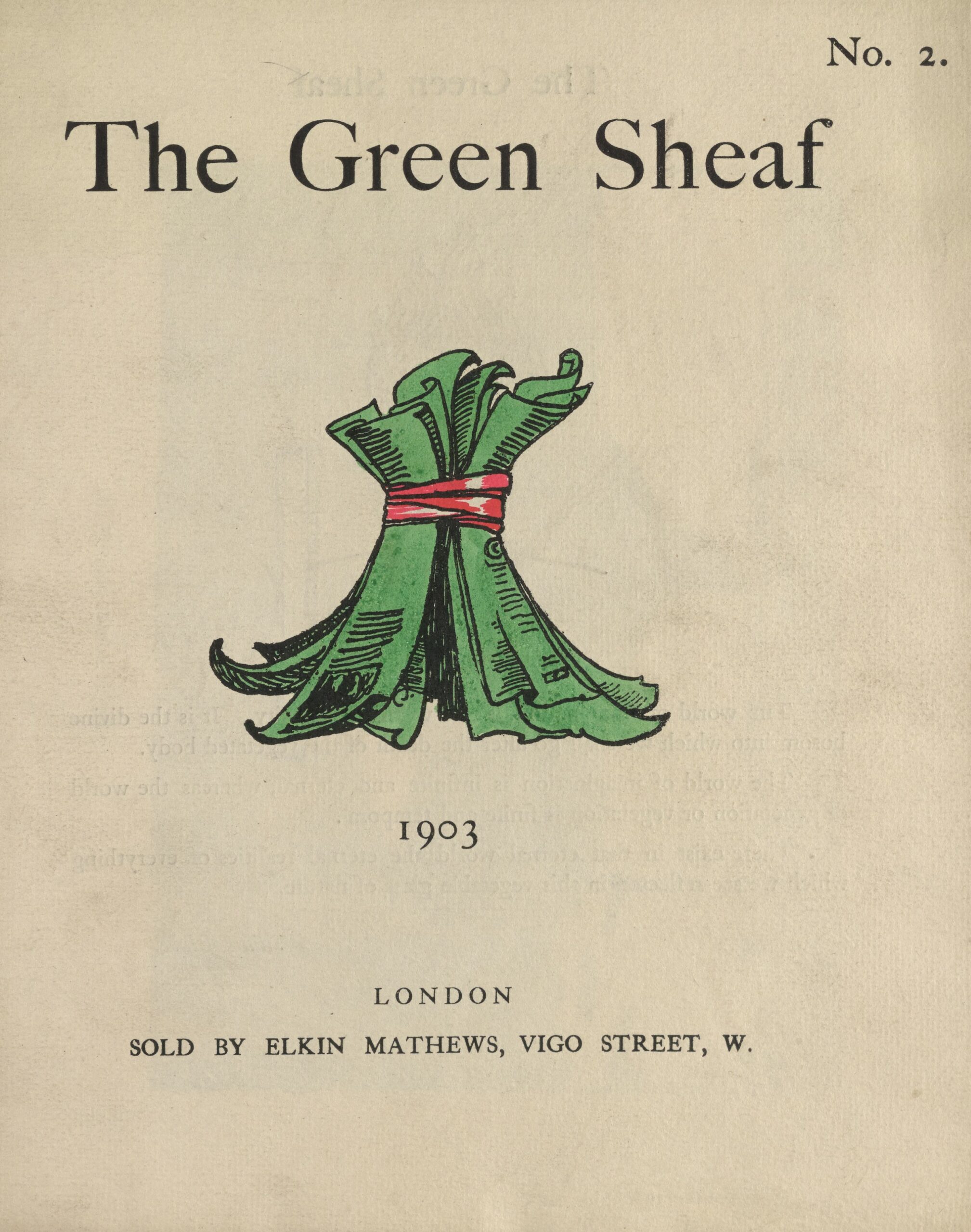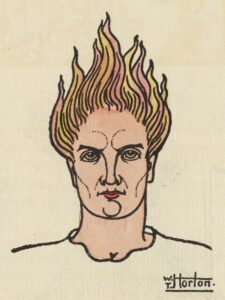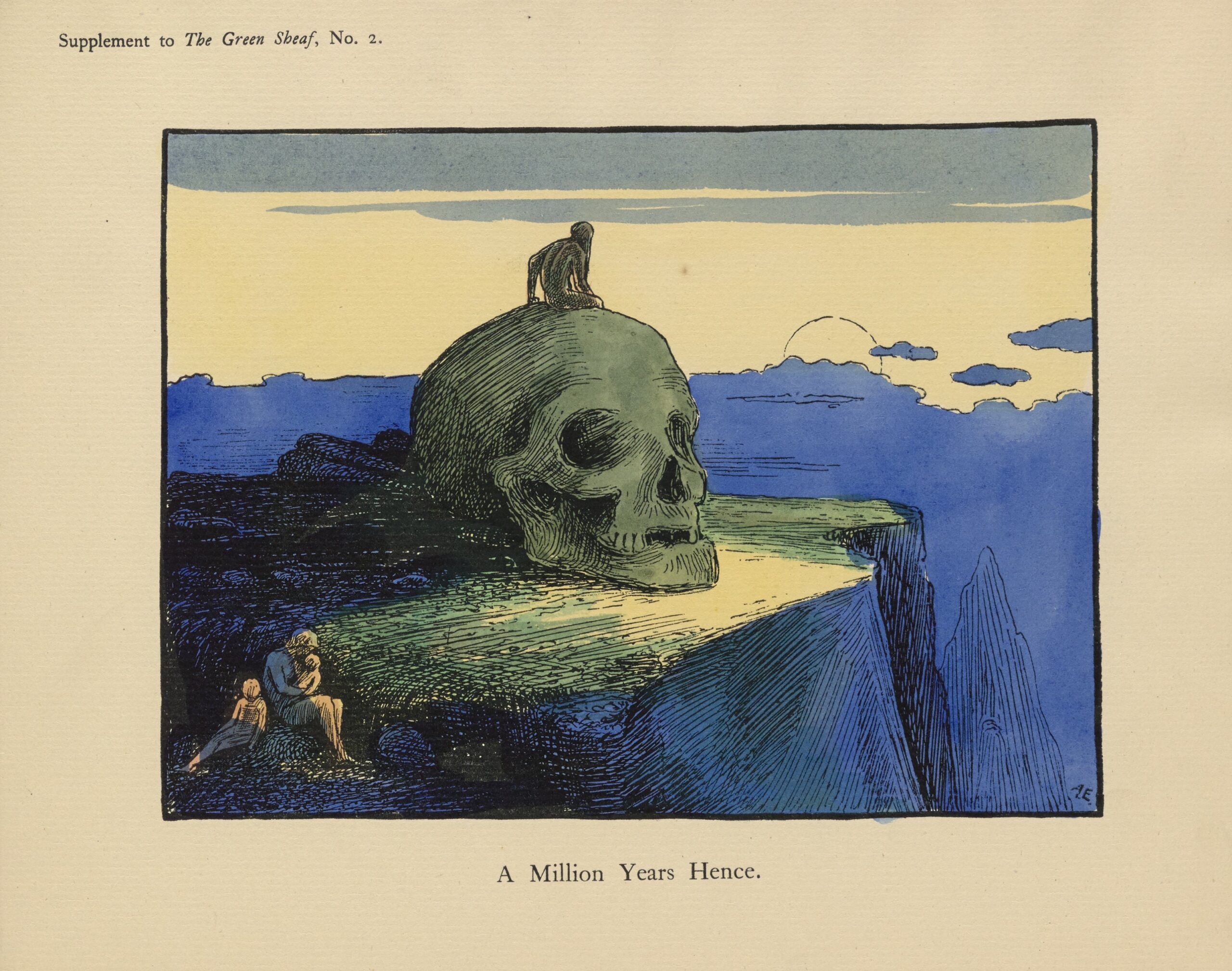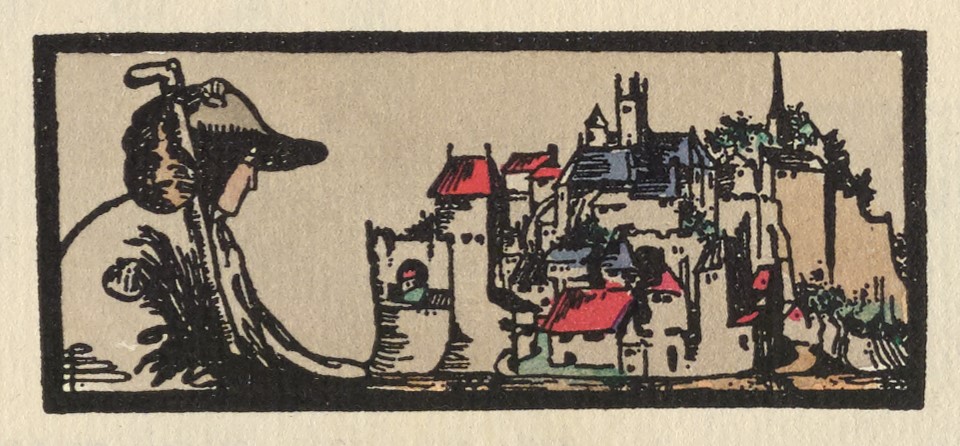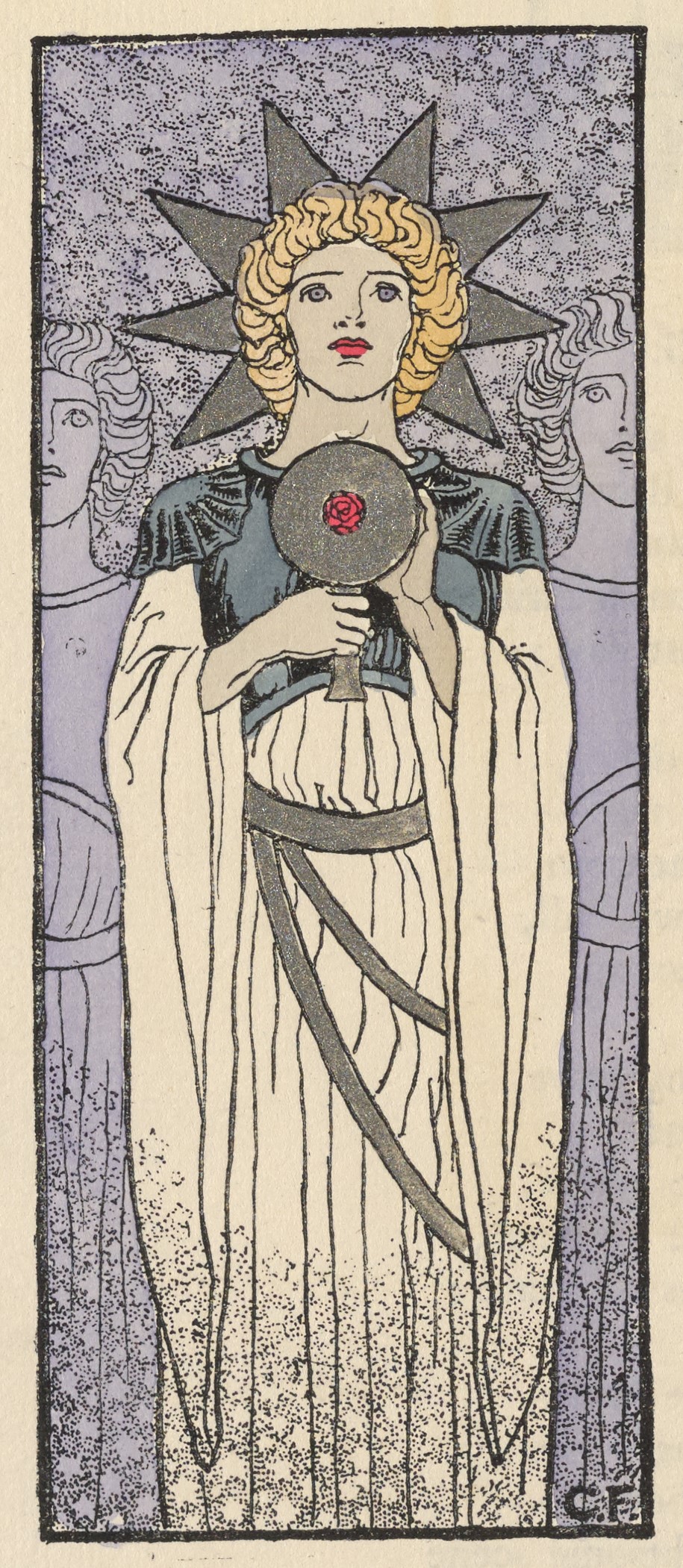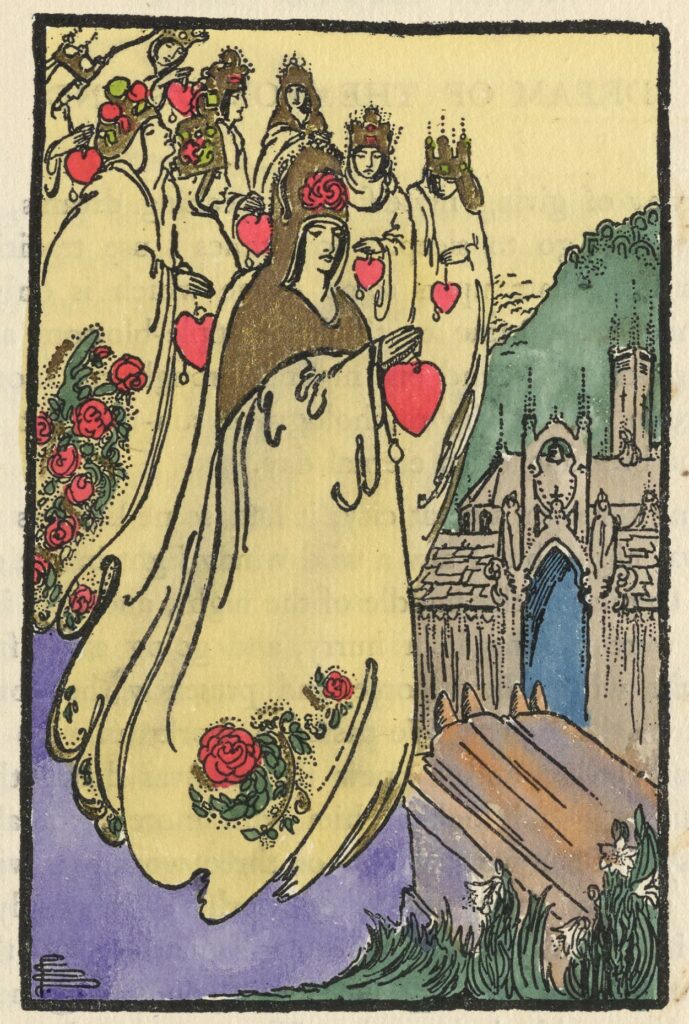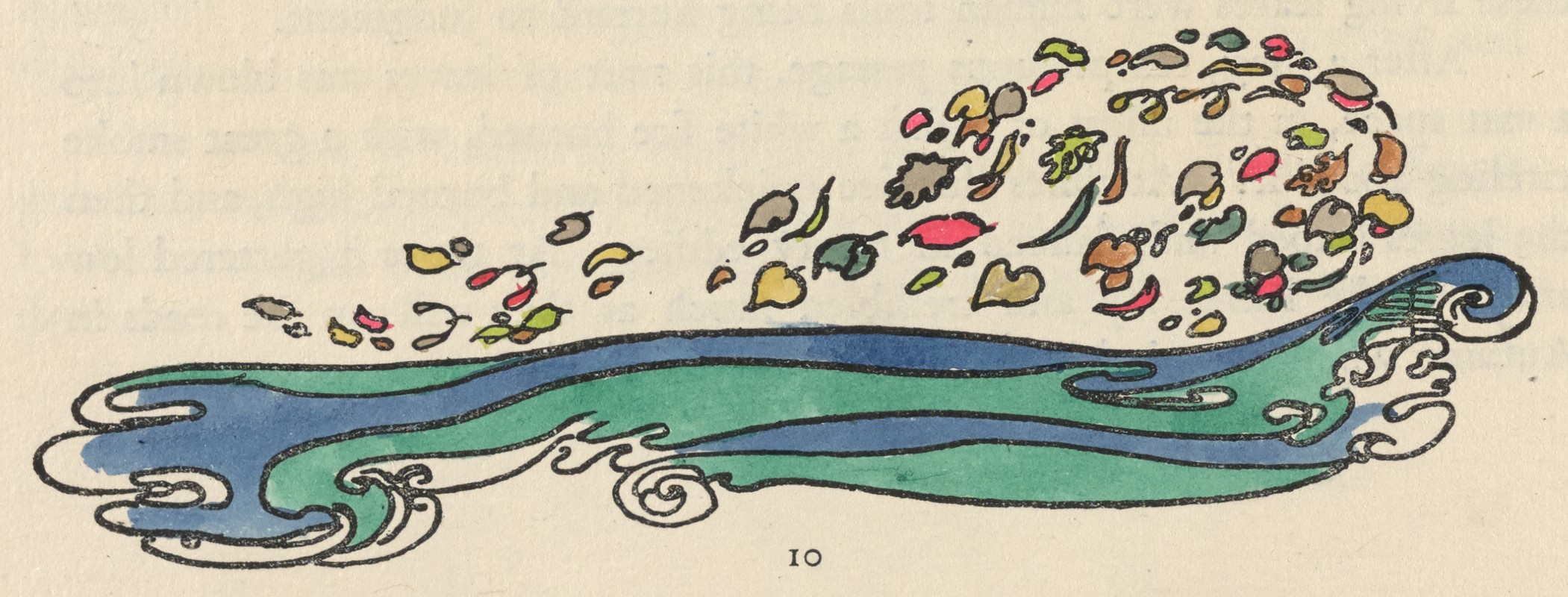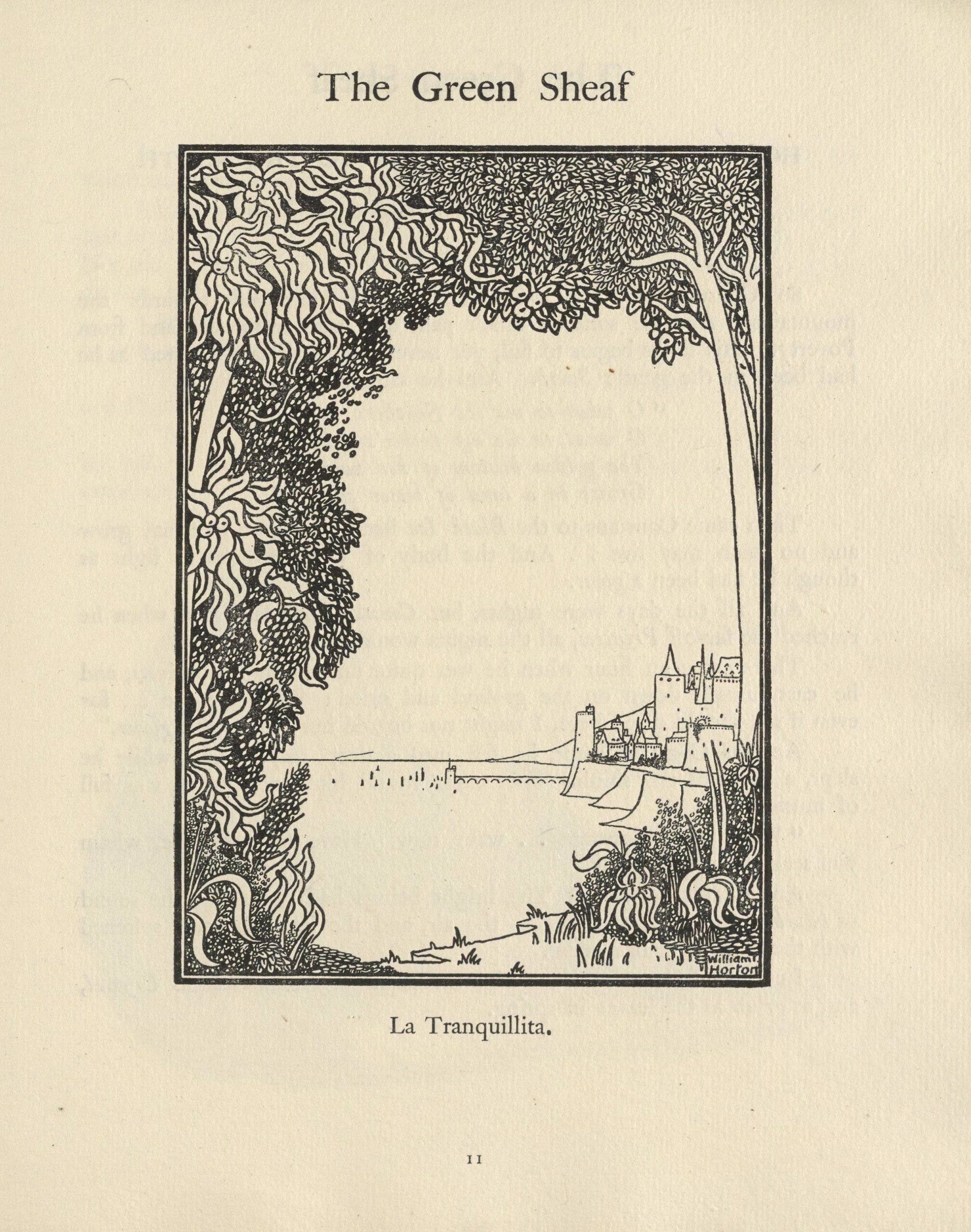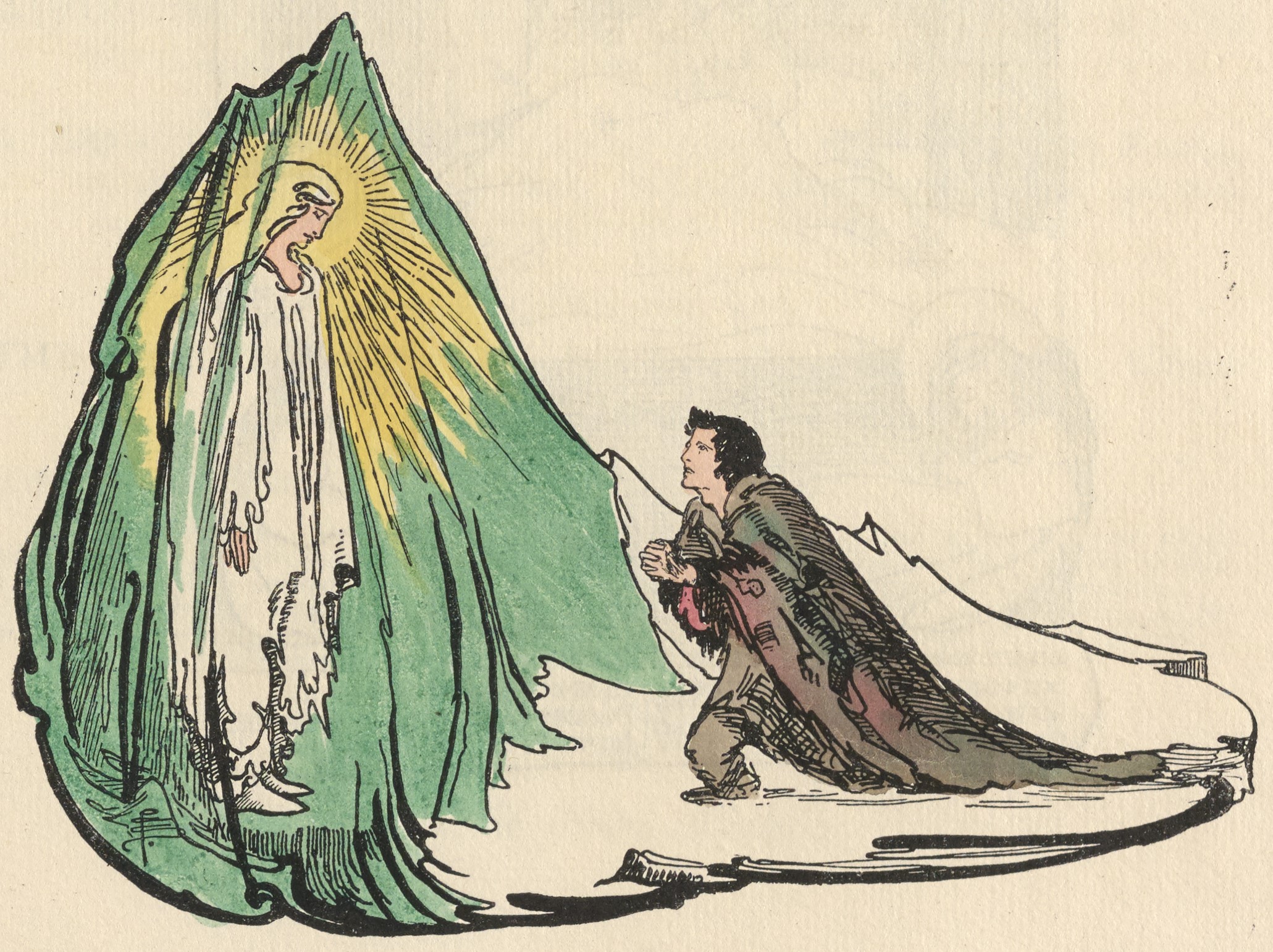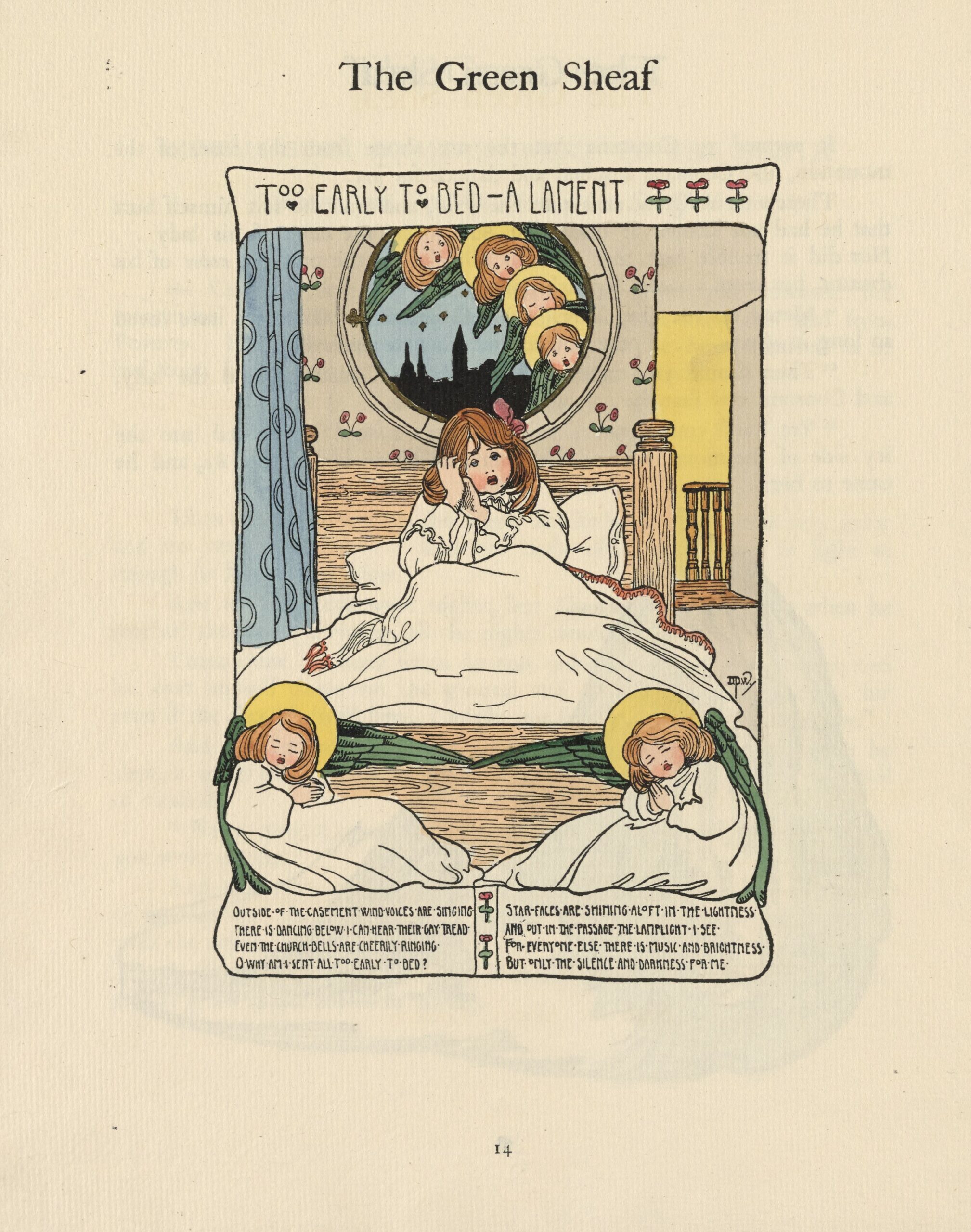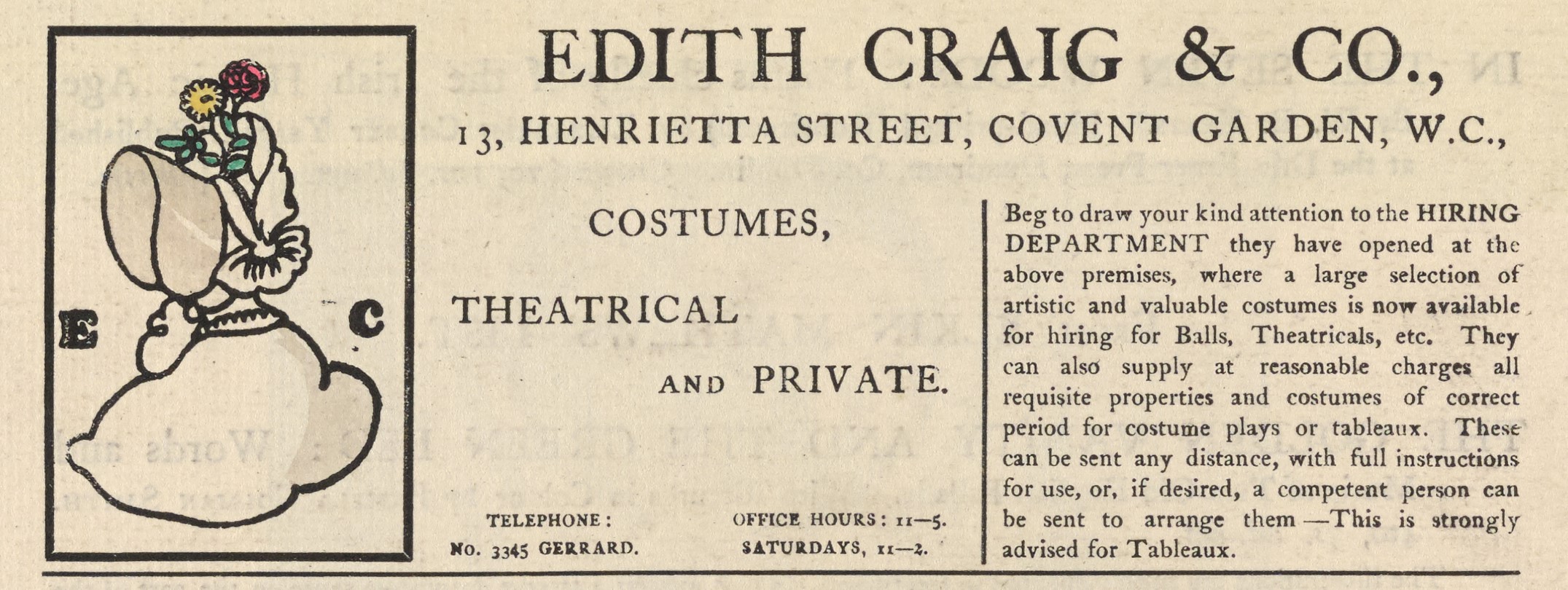TABLE OF CONTENTS
No. 2
Front Cover. by Pamela Colman
Smith [i]
Untitled. [“The World of Imagination”], by William
Blake 2
Illustration by W.T. Horton 2
Illustrative Supplement. A
Million Years Hence, by A. E. np
At Departing, by Lucilla 3
Illustration by Pamela Colman Smith 3
A Prayer to the Lord of Dreams, poem by Cecil
French 4
Illustration by Cecil French 4
Untitled [“Once in a Dream”], by Pamela Colman
Smith 5
Illustration by Pamela Colman Smith 5
Dream of the World’s End, by W.B. Yeats 6-7
A Dream on Inishmaan, by J.M.
Synge 8-9
Jan a Dreams, by John
Masefield 9-10
Illustration by Pamela Colman Smith 10
La Tranquillita, by W.T.
Horton 11
How Master Constans Went to the North, by Christopher St. John (Part II) 12-13
Illustration by Pamela Colman Smith 13
Too Early to Bed: A Lament, by Dorothy P. Ward 14
Advertisements 15-16
Advertisement for Edith Craig & Co.,
illustrated by Pamela Colman Smith 16
The world of imagination is the world of eternity. It is the divine
bosom into which we shall go after the death of the vegetated body.
The world of imagination is infinite and eternal, whereas the world
of generation or vegetation is finite and temporal.
There exist in that eternal world the eternal realities of everything
which we see reflected in this vegetable glass of nature.
William Blake.
AT DEPARTING.
As when we make a vagrant stay
In some old town, where drowsy time
As in the old-world steals away
In quiet, to the clock’s quaint chime,
And now ’tis come to our last day;
And late we saunter up and down,
Or walk on the embattled wall—
The gate-clasped girdle of the town—
Or once more visit the town-hall,
And churches of antique renown,
And take a fond and lingering leave,
As we pass on, of every part,
And while to say farewell we grieve,
We strive to get the whole by heart,
As dream, among our dreams to weave:
So when life’s end is near, we know,
And all our journeys we have been,
One hard last look we shall bestow—
Hoarding it’s dear and lightsome scene
For death’s long dark, where we must go.
Lucilla.
A PRAYER TO THE LORDS
OF DREAM
All things have conspired against me
To fill my heart with unrest.
Let me hide the world from remembrance;
To dream were surely best,
For the warring of flesh and spirit
Can only be drowned in dreams.
O Lords of the Silver Shadow,
Be tender with my dreams,
Lest even my dreams should conspire
To fill my heart with unrest.
Cecil French.
Once, in a dream, I saw a great church with a long narrow door,
and behind it rose a green hill. There was a garden on the top with
arches cut in box. The rooks cawed overhead. As I walked at the
foot of the hill I came to the church-yard, where many lilies grew; and
close by the church door was a sandstone tomb with two figures carved
on it. A foot of one of them began to wag.
Suddenly on the left there was a sound of solemn music—and many
spirits floated by. Mild faces had they; and every one carried a red
heart from which dropped a pearl—hung by a golden chain.
Then passing by they disappeared into the long blue door of the
church.
DREAM OF THE WORLD’S END
I have a way of giving myself long meaning dreams, by meditating
on a symbol when I go to sleep. Sometimes I use traditional symbols,
and sometimes I meditate upon some image which is only a symbol to
myself. A while ago I came to think of apple-blossom as an image of
the East and breaking day, and one night it brought me, not as I expected
a charming dream full of the mythology of sun-rise, but this grotesque
dream about the breaking of an eternal day.
I was going through a great city, it had some likeness to Paris about
Auteuil. It was night, but I saw a wild windy light in the sky, and knew
that dawn was coming in the middle of the night, and that it was the Last
Day. People were passing in a hurry, and going away from the light.
I was in a brake with other people, and presently the horses ran away.
They ran towards the light. We passed a workman who was making a
wall in his best clothes, and I knew that he was doing this because he
thought the Judge would look at him with more favourable eyes if he
were found busy. Then we saw two or three workmen with white faces
watching the sky by their unfinished work. Everybody now was a
workman, for it seemed to be a workman’s quarter, and there were not
many people running past us. Then I saw young workmen eating their
breakfast at a long table in a yard. They were eating raw bacon. I
understood somehow that they had thought “we may as well eat our
breakfast even though this is the Last Day”; but, that when they began
to cook it, they had thought, “it is not worth while to trouble about
cooking it.” All they needed was food, that they might live through
the Last Day calmly.
The Green Sheaf
After that, and now we seemed to have left the brake, though I did
not remember our leaving it, we came to a bridge over a wide river, and
the sky was very wild and bright, though I could not see any sun. All
in a moment I saw a number of parachutes descending, and a man in a
seedy black frock-coat came out of one of them, and began distributing
circulars. At the head of them was the name of a seller of patent
medicines, and we all understood the moment we saw the name, that
he was one of the most wicked of men, for he had put up great posters
that had spoiled many beautiful views. Each circular had printed upon it
a curse against this man, and a statement that a curse given at the end of
the world must of necessity weigh heavily with the Eternal Judge. These
curses called for the damnation of the patent medicine seller, and you were
asked to sign them at the bottom, undertaking at the same time to pay the
sum of one pound to the medicine seller if the end of the world had not
really come. I remember that the circular spoke of this “solemn
occasion,” but I do not recollect any other of the exact words. I awoke,
and was for some time in great terror, for it seemed to me that an
armed thief was hidden somewhere in the darkness of my room. Was
this some echo of what the Bible has said about “one who shall come as
a thief in the night?”
W.B. Yeats.
A DREAM ON INISHMAAN.
Some dreams I have had in a cottage near the Dun of Conchubar,
on the middle Island of Aran, seem to give strength to the opinion that
there is a psychic memory attached to certain neighbourhoods.
One night after moving among buildings with strangely intense light
upon them, I heard a faint rhythm of music beginning far away from me
on some stringed instrument.
It came closer to me, gradually increasing-in quickness and volume
with an irresistibly definite progression. When it was quite near the
sounds began to move in my nerves and blood, and to urge me to dance
with them.
I knew, even in my dream, that if I yielded to the sounds I would
be carried away to some moment of terrible agony, so I struggled to
remain quiet, holding my knees together with my hands.
The music increased again, sounding like the strings of harps tuned
to a forgotten scale, and having a resonance as searching as the strings of
the Cello.
Then the luring excitement became more powerful than my will, and
my limbs moved in spite of me.
In a moment I was swept away in a whirlwind of notes. My breath
and my thoughts and every impulse of my body became a form of the
dance, till I could not distinguish any more between the instruments and
the rhythm, and my own person or consciousness.
For a while it seemed an excitement that was filled with joy: then it
grew into an ecstacy where all existence was lost in a vortex of movement.
I could not think there had ever been a life beyond the whirling of the
dance.
The Green Sheaf
At last, with a sudden movement, the ecstacy turned to an agony and
rage. I struggled to free myself, but seemed only to increase the passion
of the steps I moved to. When I shrieked I could only echo the notes of
the rhythm.
Then, with a moment of incontrollable frenzy, I broke back to
consciousness, and awoke.
. . . . . . . . . .
I dragged myself, trembling, to the window of the cottage and
looked out. The moon was glittering across the bay, and there was no
sound anywhere on the island.
J.M. Synge.
JAN A DREAMS.
This dream, like all my in tenser dreams, commenced with a noise
as of the beating of many wings, the rush of water, and the roaring of
a sea-wind.
The tumult lasted for a few seconds, dying into a dry rustling as of
leaves scattered along a road in Autumn, and, with the subsidence of the
uproar, I woke, as it were, into the bright consciousness of vision. I
saw a multitude of dry leaves whirling, in a high wind, along a great
white road, and, in a little while, I saw that I, too, was shrunken to a
dry writhelled leaf; and then the great wind caught me, and swept me
forward among the others, and I knew, as I was blown along, that all
these flying leaves were human souls being hurried to Judgment.
After a long, tempestuous passage, this rout of leaves was blown into
a vast space, in the midst of which a white fire burned, with a great smoke
circling about it. At times this fire quickened and burned high, and then
the leaves leaped and danced in merry eddies. At times it guttered low
and then the leaves lay and trembled much as they will on the roads in
Autumn when the wind is too light to scatter them.
The Green Sheaf
In the great smoke about the fire the seven planets circled and sang,
and I knew that each note, each word, each letter of their song was a
human soul, for, at times, a dead leaf would be plucked from amongst
us and disappear among the smoke, becoming some minute part of the
great music of created things. Then I knew that the making of the
perfect music was beginning, and that the perfect song of the sailors,
and of the sea-creatures, and of the sea-weeds, and of the sea-fowl, and
of the sea-winds, and of the sea itself was about to be shapen and to
become a part of the song of the singing planets. And I, having loved the
sea, lay in my pile of leaves trembling with hope that I might be deemed
worthy of some part in that harmony.
The song began at last in a solemn paean of thunderous and glorious
words, like the running of a bright surf upon a beach. Then it trembled
down into a quiet lyric, like the chattering of a brook over pebbles;
then surged out again in a mournful andante that was like dawn, like a
grey twilight upon mountains. Then I knew that the making of a
tremendous word was in hand. A word which should signify and qualify
the sea; a vast word, gentle, tremulous and solemn, and I was plucked
forward (with a catch of joy in my heart, for I thought I had been deemed
unworthy) to become one poor letter in the great word, one frail note
in the perfect song, and then, as the completed music thundered and
throbbed among the planets, I woke.
John Masefield.
HOW MASTER CONSTANS WENT TO THE NORTH.
Heard and Told by Christopher St. John.
(Continued from No. i.)
So Constans left the warm South and journeyed towards the
mountains. And he suffered much pain and care from cold and from
Poverty. His limbs began to fail, yet never was he heavy-hearted as he
had been in the gentle South. And he sang always:
“O what to me the Southern air . .
O what to me my father’s gold . .
The golden blossom of her hair
Grows in a land of bitter cold.”. . .
Then came Constans to the Black Ice itself, where no tree may grow
and no man may live . . And the body of Constans was as light as
though he had been a ghost.
And all the days were nights, but Constans had faith that when he
reached the far-off Princess, all the nights would be days.
There came an hour when he was quite undone by his Sickness, and
he cast himself down on the ground and cried : “Let me die . . for
even if she should dwell here, I might not behold her face in this gloom.”
And as Constans wept, he fell into a deep sleep. And while he
slept, a troop of the shining ones came round him, and the air was full
of musick.
“Wake now, Constans . . wake now. Have faith, for she, whom
you seek, is near.”
And Constans awoke. The bright beings had gone, but the sound
of hautboys and flutes was still in the air, and the icy wind was softened
with the smell of frankincense.
In front of Constans was a high mountain of ice as clear as Crystal,
and as green as the leaves in spring.
The Green Sheaf
It seemed to Constans that the sun shone from the heart of the
mountain, and Constans laughed and danced for joy.
Therewith he drew nearer to the Hill, and now he felt himself hurt
that he had not known at once that Sun to be the hair of his lady . .
Nor did it trouble him that she was not clad in the princely robes of his
dreams, but wore a mean beggar’s garment.
“Mercy on me, my lady,” cried Constans. “Since we have loved
so long in dream . . I pray you tell me how to reach you.”
“Then should you taste of death Master Constans,” said the lady,
and Constans saw that she was whiter than snow.
“Yet I will come nearer,” said Constans. And he walked into the
icy side of the mountain, and his faith like flame melted the ice, and he
came to her.
ADVERTISEMENTS.
IN THE SEVEN WOODS: Poems chiefly of the Irish Heroic Age.
By W. B. Yeats. Hand-printed (Rubricated) by Elizabeth Corbet Yeats. Published
at the Dún Emer Press, Dundrum, Co. Dublin. Crown 8vo, 10s. 6d. net. [Shortly.
From ELKIN MATHEWS’ LIST.
THE GOLDEN VANITY AND THE GREEN BED: Words and
Music of Two Old English Ballads. With Pictures in Colour by Pamela Colman Smith.
4to, 7s. 6d. net.
“The illustrations are highly spirited in treatment. They exhibit a strong decorative
sense on the part of the
artist, the colour scheme being remarkably bold and well ‘harmonised.’”—Studio.
WIDDICOMBE FAIR: A series of 13 Coloured Drawings to this Old
West Country Ballad. By Pamela Colman Smith. 4to, in portofolio, 10s. 6d. net.
A BROAD SHEET—For the Year 1902: With Pictures by Pamela
Colman Smith and Jack B. Yeats. Hand-coloured. Twelve numbers, post free,
12s. 6d. net. A portfolio may be had at 2s. net.
Fourth Edition Now Ready.
THE WIND AMONG THE REEDS. By W. B. Yeats. Crown
8vo, 3s. 6d. net.
SONGS OF LUCILLA. Crown 8vo, 3s 6d. net.
“The author of these verses shows a very considerable power of writing. She has not
merely the accom-
plishments of style and melody, but has a way of attacking her subject which shows
real power, the power to think
as well as to turn that wonderful verbal kaleidoscope which is the heritage of all
the poets of this generation. . . .
[The poem ‘A Drunken Satyr’] is full of the spirit of Keats, and suggests all through
Keats’ way of writing, but
nevertheless it arrests the attention as only a poem of originality can. Above all,
it shows promise.”—Spectator.
Published by ELKIN MATHEWS, Vigo Street,
Nigh the Albany, London.
The Green Sheaf
MLA citation:
The Green Sheaf, No. 2, 1903. Green Sheaf Digital Edition, edited by Lorraine Janzen Kooistra. Yellow Nineties 2.0, Toronto Metropolitan University Centre for Digital Humanities, 2022. https://1890s.ca/gsv2_all/
